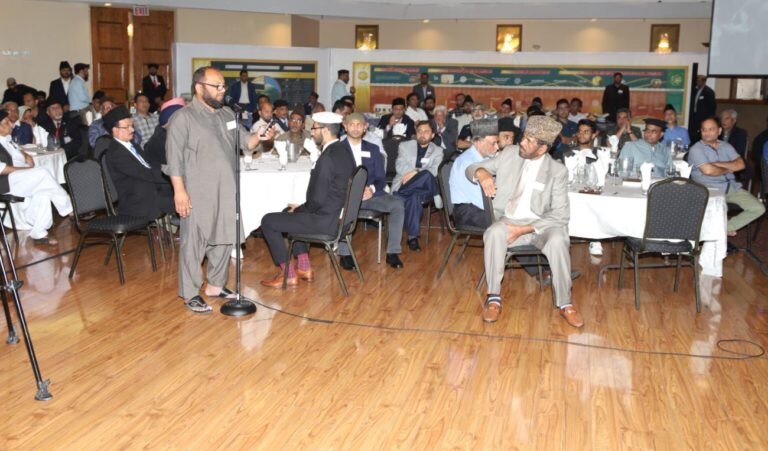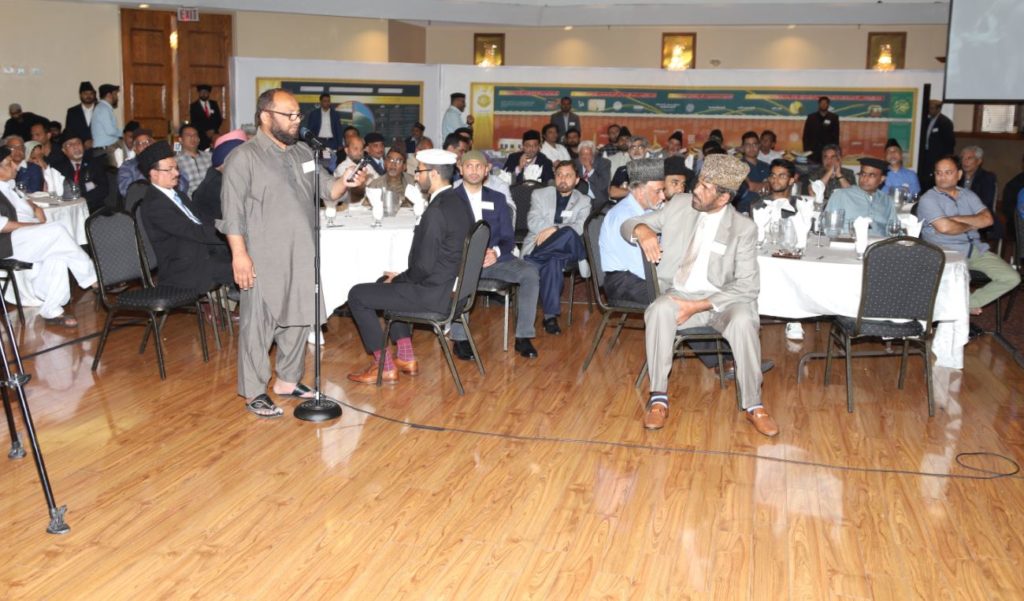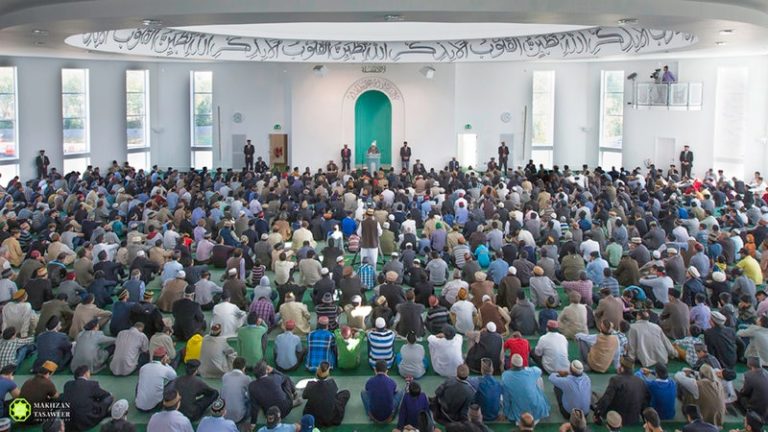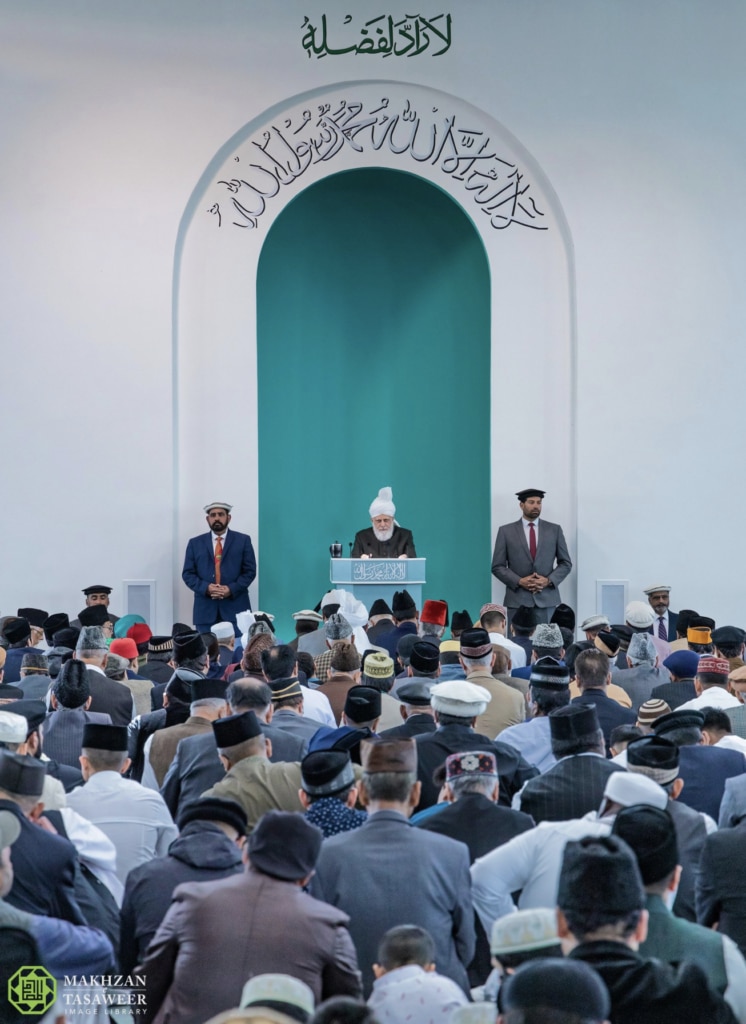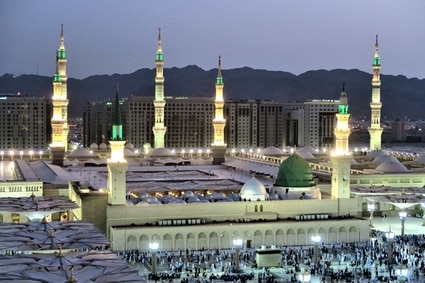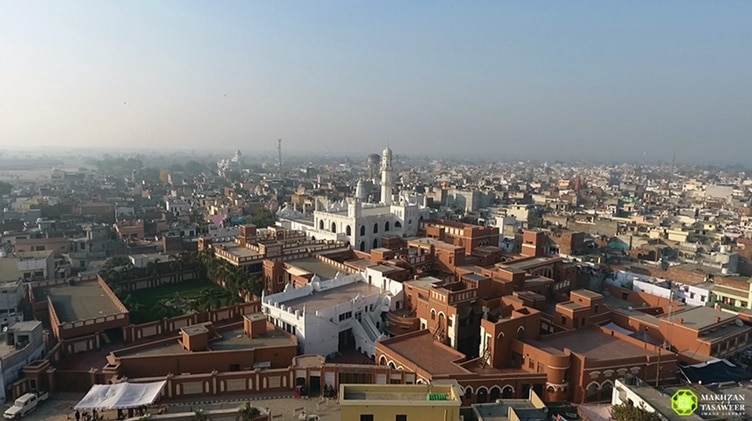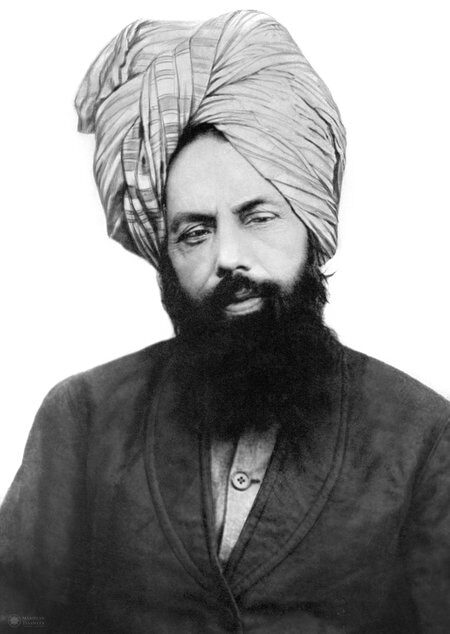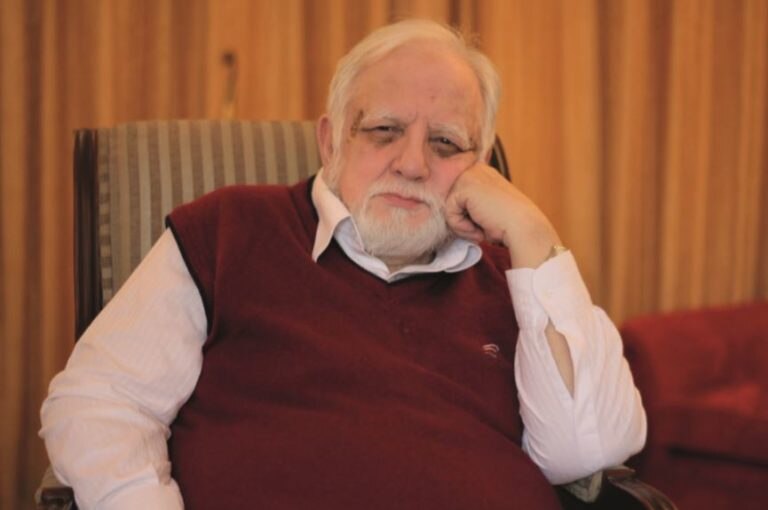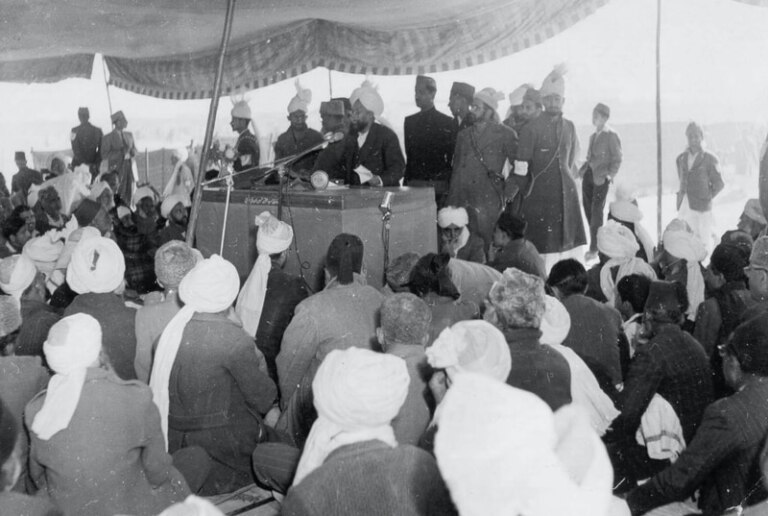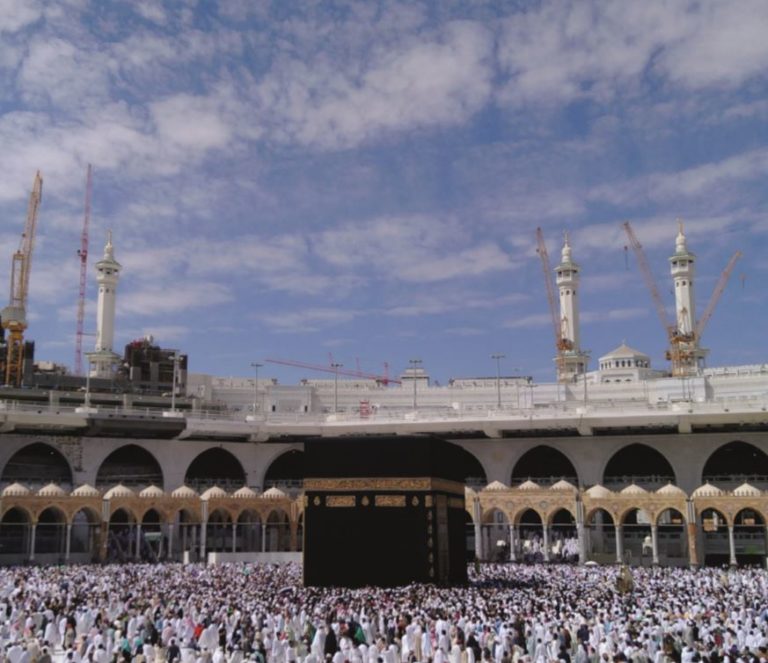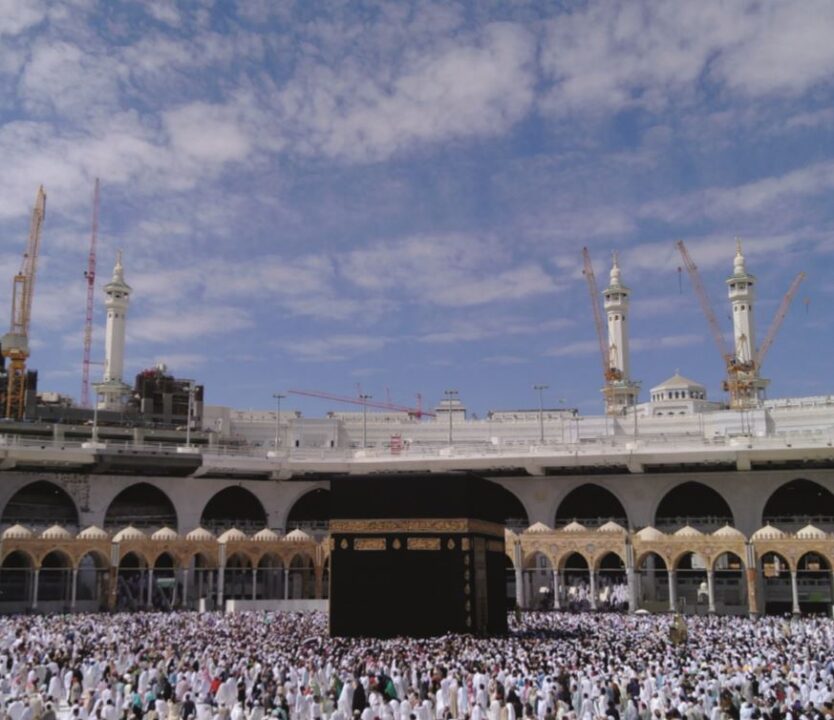Friday Sermon
19 July 2019
Men of Excellence
After reciting the Tashahud, Ta‘awuz, and Surah al-Fatihah, Hazrat Khalifatul Masih Vaa stated:
Today, I shall continue to relate the account of the lives of the Badri Companionsra [i.e those companions who took part in the Battle of Badr].
The name of the first companion who I shall mention
today is Hazrat Amirra bin Salama. Hazrat Amirra bin
Salama is also referred to as Amr bin Salama. He belonged to the Balee tribe.
Balee is a branch of the ancient Arab tribe of Qudha‘ah which is found in
Yemen. Due to this association, he is also referred to as Amirra bin
Salama Balawi. Hazrat Amirra was a confederate of the Ansar. Hazrat
Amirra bin Salama had the honour of participating in the battles of
Badr and Uhud. (Al-Sirat Al-Nabwai Li Ibn Hisham, p. 468,
Dar-ul-Kutub Al-Ilmiyyah, 2001) (Al-Tabaqaat-ul-Kubra, Vol. 3, p. 280,
Dar-e-Ahya Al-Turath Al-Arabi, Beirut, Lebanon, 1996) (Usdul Ghaba, Vol.
3, p. 121, Amirra bin Salama, Dar-ul-Kutub al-Ilmiyyah, Beirut,
2008)
The name of the second companion to be mentioned is
Hazrat Abdullahra bin Suraqah. Hazrat Abdullahra bin
Suraqah belonged to the Banu Adi clan of the Quraish, which was the tribe of
Hazrat Umarra bin al-Khattab.
Hazrat Abdullahra bin Suraqah’s lineage
connects with Hazrat Umarra through a man called Ryaah in the fifth
generation of his ancestors. His lineage connects with the Holy Prophetsa
through a man called Kaab in the tenth generation of his ancestors. Hazrat
Abdullahra bin Suraqah’s father was Suraqah bin Mu‘tamir and his
mother’s name was Amah bint Abdullah. His sister’s name was Zainab and his
brother’s name was Amrra bin Suraqah.
Hazrat Abdullahra bin Suraqah’s wife was
Umaimah bint Harith with whom he had his son called Abdullah. The majority of
historians have mentioned that he participated in the Battle of Badr. However,
some are of the opinion that he did not participate in Badr but participated in
the Battle of Uhud and the subsequent battles. In any case, according to the
majority of them, Hazrat Abdullahra and his brother, Amrra
bin Suraqah had the honour of participating in the Battle of Badr. We find the
names of Umar or Uthman bin Abdullah, Zaid and Ayyub bin Abdur Rahman among the
progeny of Hazrat Abdullahra.
(Al-Sirat Al-Nabwai Li Ibn Hisham, p. 462,
Dar-ul-Kutub Al-Ilmiyyah, 2001) (Al-Isaba Fi Tamyeez Al-Sahaba, Vol. 4,
pp. 91-92, Abdullahra bin
Suraqah, Dar-ul-Kutub al-Ilmiyyah, 2005) (Usdul Ghaba, Vol. 3, p. 256,
Abdullahra bin Suraqah, Vol.
4, p. 137, Umarra bin al-Khattab, Vol. 1, p. 121, Muhammadsa
Rasool Allah, Dar-ul-Kutub al-Ilmiyyah, Beirut, 2008)
Abdullah bin Abu Bakr narrates that Hazrat Abdullahra
bin Suraqah migrated from Mecca to Medina alongside his brother, Amr. Both of
them stayed at the home of Hazrat Rifa‘ahra bin Abdil Munzir. (Al-Tabaqaat-ul-Kubra,
Vol. 4, p. 389, Abdullahra bin Suraqah, Dar-e-Ahya Al-Turath
Al-Arabi, Beirut, Lebanon, 1996)
Hazrat Abdullahra bin Suraqah passed away
during the Khilafat of Hazrat Uthmanra in 35 AH. (Al-Badaya Wa
Al-Nahaya, Vol. 4, Pt. 7, p. 212, Dar-ul-Kutub al-Ilmiyyah, Beirut, 2001)
It is narrated by Hazrat Abdullahra bin
Suraqah that the Holy Prophetsa stated:
تَسَحَّرُوْا وَلَوْ بِالْمَاءِ
i.e. “Partake of the Sehri [meal taken early in the
morning before fasting], even if it is only with water.” This meant that it is
incumbent to partake of Sehri. (Usdul Ghaba, Vol. 3, p. 256,
Abdullahra bin Suraqah, Dar-ul-Kutub al-Ilmiyyah, Beirut, 2008)
The next companion to be mentioned is Hazrat Malikra
bin Abu Khauli. Hazrat Malikra bin Abu Khauli belonged to the tribe
of Banu Ijal who were confederates of the Banu Adi bin Kaab clan of the
Quraish. His father’s title was Abu Khauli while his actual name was Amr bin
Zuhair. Hazrat Malik’sra name is also recorded as Hilaal. (Al-Sirat
Al-Nabwai Li Ibn Hisham, p. 462, Dar-ul-Kutub Al-Ilmiyyah, 2001) (Al-Tabaqaat-ul-Kubra,
Vol. 3, p. 209, Khauli bin Abi Khauli, Dar-e-Ahya Al-Turath Al-Arabi, Beirut,
Lebanon, 1996)
When Hazrat Umarra migrated from Mecca to
Medina, he was also accompanied by Hazrat Malikra and his brother
Hazrat Khaulira in addition to the rest of the members of his own
family. (Al-Sirat Al-Nabwai Li Ibn Hisham, p. 338, Dar-ul-Kutub
Al-Ilmiyyah, 2001)
Hazrat Malikra participated in the Battle
of Badr alongside his brother Khaulira and according to one
narration, Hazrat Khaulira participated in the Battle of Badr
alongside his two brothers Hazrat Hilaalra i.e. Hazrat Malik, and
Hazrat Abdullahra. (Al-Tabaqaat-ul-Kubra, Vol. 3, p. 209,
Khaulira bin Abi Khauli, Dar-e-Ahya Al-Turath Al-Arabi, Beirut,
Lebanon, 1996)
Hazrat Malikra bin Abu Khauli passed away
during the Khilafat of Hazrat Uthmanra. (Al-Isaba Fi Tamyeez
Al-Sahaba, Vol. 5, p. 533, Malikra bin Abi Khauli, Dar-ul-Kutub
al-Ilmiyyah, Beirut, 2005)
The next companion to be mentioned is Hazrat Waqidra
bin Abdullah. Hazrat Waqid’s father was Abdullah bin Abd-i-Manaf. He belonged
to the tribe of Banu Tamim. Hazrat Waqidra was a confederate of
Khattab bin Nufail and according to one narration, he was a confederate of the
Banu Adi bin Kaab, which was one of the tribes of Quraish. (Al-Tabaqaat-ul-Kubra,
Vol. 3, p. 298, Waqidra bin Abdullah, Dar-ul-Kutub al-Ilmiyyah,
Beirut, 1990) (Usdul Ghaba Fi Marifat Al-Sahaba, Vol. 5, p. 403, Waqidra
bin Abdullah, Dar-ul-Kutub al-Ilmiyyah, Beirut, 2008)
Hazrat Waqidra is among the individuals we
find a mention of in the books of history, who accepted Islam as a result of
the preaching efforts of Hazrat Abu Bakrra. (Al-Sirat Al-Nabwai
Li Ibn Hisham, vol. 1, p. 170,
Dar-ul-Kitaab Al-Arabi, Beirut, 2008)
Hazrat Waqidra accepted Islam prior to the
Holy Prophetsa going to Dar-e-Arqam. (Al-Tabaqaat-ul-Kubra li ibn
Saad, Vol. 3, p. 298, Waqidra bin Abdullah, Dar-ul-Kutub
al-Ilmiyyah, Beirut, 1990)
I have already spoken about Dar-e-Arqam some time ago,
however, I will briefly mention it again. The Holy Prophetsa
considered establishing a tablighi centre [for the purpose of
propagating the message of Islam] in Mecca, where Muslims could gather together
for prayers etc. and to peacefully and without any hindrance seek guidance from
the Holy Prophetsa regarding matters relating to their moral
training, as well as serving as a place where the message of Islam could be
preached from. Therefore, for this purpose, they were in need of a house, which
could serve as a centre or the headquarters. Hence, the Holy Prophetsa
chose the house of Arqamra bin Abi Arqam, who had recently accepted
Islam. This house was located at the foot of mount Safa.
Following this, Muslims would gather and offer the
prayers at this very place. Furthermore, when those people who were in search
for the truth came to the Holy Prophetsa, he would preach to them
the message of Islam in this very place. Due to this very reason, this house
has become renowned in history and is also famously known as Dar-ul-Islam. The
Holy Prophetsa fulfilled his responsibilities from Dar-e-Arqam for
approximately three years; that is, he made it the centre in the fourth year
after his appointment to prophethood and continued his works of preaching and
providing moral training from there until the end of the sixth year. Historians
write that the last person to accept Islam in Dar-e-Arqam was Hazrat Umarra
and that following his acceptance of Islam, the Muslims were greatly
strengthened and that they left Dar-e-Arqam and openly started to preach the
message of Islam. (Sirat Khatamun-Nabiyyin, Hazrat Mirza Bashir
Ahmadra, p. 129)
When Hazrat Umarra migrated from Mecca to
Medina, along with other members of his family, Hazrat Waqidra also
accompanied him. After migrating from Mecca to Medina, Hazrat Waqidra
stayed with Hazrat Rifa‘ahra bin Abd-il-Munzir. Following this, the
Holy Prophetsa formed a bond of brotherhood between Hazrat Waqidra
and Hazrat Bishrra bin Bara‘ah. (Al-Tabaqaat-ul-Kubra li ibn Saad,
Vol. 3, p. 298, Waqidra bin Abdullah, Dar-ul-Kutub al-Ilmiyyah,
Beirut, 1990)
Hazrat Waqidra participated in all the
battles alongside the Holy Prophetsa in all battles, including the
battles of Badr, Uhud and Khandaq. (Al-Tabaqaat-ul-Kubra li ibn Saad,
Vol. 3, p. 299, Waqidra bin Abdullah, Dar-ul-Kutub al-Ilmiyyah,
Beirut, 1990)
When the Holy Prophetsa sent an expedition
under the command of Hazrat Abdullahra bin Jahash, Hazrat Waqidra
was also a member of this delegation. (Usdul Ghaba Fi Marifat Al-Sahaba,
Vol. 5, p. 403, Waqidra bin Abdullah, Dar-ul-Kutub al-Ilmiyyah,
Beirut, 1994)
An individual from the kuffar [disbelievers],
Amr bin Hazrami was killed by Hazrat Waqidra during this expedition.
This was the first idolater to have been killed in the history of Islam and
Hazrat Waqidra was the first Muslim to have killed an idolater
during any battle. (Usdul Ghaba Fi Marifat Al-Sahaba, Vol. 5, p. 404,
Waqidra bin Abdullah, Dar-ul-Kutub al-Ilmiyyah, Beirut, 1994)
I have previously mentioned the details of this battle
whilst relating the account of Hazrat Abdullahra bin Jahash. Hazrat
Waqidra passed away towards the beginning of the caliphate of Hazrat
Umarra. (Usdul Ghaba Fi Marifat Al-Sahaba, Vol. 5, p. 405,
Waqidra bin Abdullah, Dar-ul-Kutub al-Ilmiyyah, Beirut, 1994)
Then, the next companion to be mentioned is Hazrat
Nasr bin Harithra. Hazrat Nasr bin Harithra belonged to
Banu Abd bin Razzakh which was from the Aus family of the Ansar. His name is
also mentioned as Numair bin Harith. His title was Abu Harith. His father was
Harith bin Abd and his mother was Saudah bint Suwwad. (Al-Tabaqaat-ul-Kubra,
Vol. 3, p. 346, Dar-ul-Kutub al-Ilmiyyah, Beirut, 1990), (Al-Sirat Al-Nabwai
Li Ibn Hisham, Vol. 1, p. 405,
Dar-ul-Kitaab Al-Arabi, Beirut, 2008)
Hazrat Nasr bin Harithra had the honour of
participating in the Battle of Badr. His father, Harithra, also had
the honour of being a companion of the Holy Prophetsa. Hazrat Nasrra
was martyred during the battle of Qadisiyyah. (Usdul Ghaba Fi Marifat
Al-Sahaba, Vol. 5, p. 299, Nasr bin Harithra, Dar-ul-Kutub
al-Ilmiyyah, Beirut, 1994)
Qadisiyyah is an area in Iran, or modern-day Iraq,
situated at a distance of 45 miles from Kufa. In the 14 AH and during the
caliphate of Hazrat Umarra, a decisive war was fought between
Muslims and Sassanidsat Qadisiyyah. As a result of this, the Sassanid
Empire fell into the hands of the Muslims. (Tarikh Al-Tabari, Vol. 4, p.
111, Dar-ul-Fikr, Beirut, 2002) (Furhung Sirat by Syed Fazl-ul-Rehman,
p. 229, Zawar Academy, Karachi, 2003)
The next companion is Hazrat Malikra bin
Amr. Hazrat Malikra bin Amr belonged to Banu Hijr, which was a
branch of the tribe of Banu Sulaim, who were confederates of Banu Abd-i-Shams.
His father was Amr bin Sumait. Hazrat Malikra participated in the
Battle of Badr along with his two brothers, Hazrat Saqfra bin Amr
and Hazrat Mudlijra bin Amr. (Al-Sirat Al-Nabwai Li Ibn Hisham,
p. 326, Dar Ibn Hazam, Beirut, 2009) (Subul-ul-Huda Wa Al-Rishaad, Sirat
Khair-ul-Ibaad, Vol. 4, p. 116, Dar-ul-Kutub al-Ilmiyyah, Beirut, 1993)
Hazrat Malikra participated alongside the
Holy Prophetsa in the Battle of Uhud and other battles and he was
martyred during the battle of Yamama in 12 AH. (Al-Tabaqaat-ul-Kubra
li ibn Saad, Vol. 3, p. 72, Dar-ul-Kutub al-Ilmiyyah, Beirut,
1990)
The next companion to be mentioned is Hazrat Numanra
bin Asr. Hazrat Numanra belonged to the Ansar tribe of Bali and was
a confederate of the tribe of Banu Muawiyah. He was also called Laqeet bin Asr.
Similarly, he was also known as Numan bin Balwi. Hazrat Numanra bin
Asr participated alongside the Holy Prophetsa in the Bai‘at-e-Aqba,
the Battle of Badr as well as all other battles. He was martyred during the
battle of Yamama and according to some, Hazrat Numanra was the
individual who was martyred by Tulaihah during the battle with the apostates,
after the demise of the Holy Prophetsa. (Al-Sirat Al-Nabwai Li
Ibn Hisham, pp. 466 – 467, Dar-ul-Kutub al-Ilmiyyah, Beirut, 2001) (Usdul
Ghaba Fi Marifat Al-Sahaba, Vol. 5, p. 318, Nasr, Dar-ul-Kutub al-Ilmiyyah,
Beirut, Lebanon, 2008) (Al-Isaba Fi Tamyeez Al-Sahaba, Vol. 5, p. 510,
Dar-ul-Kutub al-Ilmiyyah, Beirut, 2005)
The next companion to be mentioned is Hazrat Uwaimra
bin Saidah. Hazrat Uwaimra bin Saidah belonged to Banu Amr bin Auf,
which was a branch of the Aus tribe. Hazrat Uwaimra participated in
both the first and the second Bai‘at at Aqba. According to the reference found
in Sirat Khatam-un-Nabiyyin [The Life and Character of the Seal of
Prophetssa], prior to the first Bai‘at at Aqba, a group of six Ansar
from Medina accepted the Holy Prophetsa. According to some
narrations, eight individuals are mentioned. Hazrat Uwaimra bin
Saidah is said to be among these companions.
According to Al-Tabaqaat-ul-Kubra, on the
occasion of the migration towards Medina, the Holy Prophetsa formed
a bond of brotherhood between Hazrat Uwaimra bin Saidah and Hazrat
Umarra and according to another narration, with Hazrat Hatibra
bin Abi Balta.
Hazrat Abdullahra bin Zubair narrates that
he heard the Holy Prophetsa say, “What an exceptional servant of
Allah Uwaimra bin Saidah is and he is also among the dwellers of
heaven!”
According to a narration when the following verse of
the Holy Quran was revealed:
فِیۡہِ
رِجَالٌ یُّحِبُّوۡنَ اَنۡ یَّتَطَہَّرُوۡا ؕ وَ اللّٰہُ یُحِبُّ الۡمُطَّہِّرِیۡنَ
the Holy Prophetsa stated, “What an
excellent individual is Uwaim bin Saidah, who is also counted among this group
of people.”
The translation of the aforementioned verse is, “In it
are men who love to become purified, and Allah loves those who purify
themselves.” (Surah al-Taubah: V.8)
Hazrat Uwaimra bin Saidah participated in
all the battles alongside the Holy Prophetsa, including the battles
of Badr, Uhud and Khandaq. Asimra bin Suaid narrates that he heard
the following narration from the daughter of Hazrat Uwaimra bin Saidah:
“When Hazrat Umarra bin al-Khattab stood by
the grave of Hazrat Uwaimra bin Saidah, he said, ‘There is no one in
the world who can claim that they are better than the one lying in this grave.
Uwaimra stood by the flag of every expedition that was commissioned
by the Holy Prophetsa.’” (Usdul Ghaba Fi Marifat Al-Sahaba,
Vol. 4, p. 304, Uwaimra bin Saidah, Dar-ul-Kutub al-Ilmiyyah,
Beirut, 1994)
According to one narration, it is mentioned that in
the days of ignorance [i.e. prior to the advent of Islam] Suaid, the father of
Harith, killed Ziyad, who was the father of Hazrat Mujazarra. After
this incident, one day, the deceased’s son, Hazrat Mujazarra, was
able to get hold of Suaid and killed his father’s murderer. Both these
incidents occurred before the advent of Islam. It was this very incident that
subsequently led to the battle of Bu‘ath which was fought between the Aus and
Khizraj tribe.
Later, after the migration of the Holy Prophetsa
to Medina, the sons of both these individuals who were killed, i.e. Harith bin
Suaid and Hazrat Mujazarra bin Ziyad converted to Islam and both of
them also participated in the Battle of Badr. It is not known as to how
authentic this narration is, but it states that after accepting Islam, Harith
bin Suaid would look for an opportunity to avenge his father’s murder by
killing Hazrat Mujazarra but he never got the chance.
During the Battle of Uhud when the Quraish turned
around and attacked the Muslims a second time, Harith bin Suaid attacked Hazrat
Mujazarra from his back and martyred him by striking his neck.
According to one narration, it is mentioned that Harith bin Suaid also martyred
Hazrat Qaisra bin Zaid also. When the Holy Prophetsa was
returning from the Battle of Hamra ul Asad, Hazrat Gabrielas came to
the Holy Prophetsa and informed him that Harith bin Suaid was in
Quba at the time and that he had killed Hazrat Mujazarra bin Ziyad
by way of deception. Gabrielas said to the Holy Prophetsa
that he should kill Harith bin Suaid for the murder of Hazrat Mujazarra
bin Ziyad. Upon hearing this, the Holy Prophetsa travelled to Quba
immediately. Usually, he would not go to Quba at that time [of the year] as it
would be very hot.
Upon the Holy Prophet’ssa arrival, the
Muslims from the Ansar who were residents of Quba gathered around him. Harith
bin Suaid was also among those who had gathered around the Holy Prophetsa.
He had wrapped himself in one or two yellow sheets of cloth. Upon the
instructions of the Holy Prophetsa, Hazrat Uwaimarra bin
Saidah killed Harith bin Suaid at the entrance of Masjid Quba. The name of the
companion being mentioned here is recorded as Uwaimar in Seeratul Halabiyah
instead of Uwaim, whereas in all other places such as Tabaqaat and ibn
Saad etc. his name is recorded as Uwaim bin Saidah.
However, according to another narration, the Holy
Prophetsa did not instruct Uwaim bin Saidah to kill Suaid, who had
martyred another Muslims by way of deceit. And since they were both Muslims, therefore
equitable retaliation in the matterof the slain was
prescribed.
According to another narration, it states that Hazrat
Uthmanra was instructed by the Holy Prophetsa to punish
him. There is yet another narration which mentions that Harith stated:
“By God! I have killed Mujazar not because I have turned away from Islam. Neither do I have any doubts about the truthfulness of this religion. I did it because Satan made me feel a sense of honour and pride [to seek revenge]. Now I seek repentance from God and His Messengersa
for my action, and I am willing to pay the blood-money for it. I shall fast for
two months continuously and will free a slave as well.” However, the Prophet of
Allahsa did not accept Harith’s apology and the death penalty was
upheld. (Al-Sirat al-Halabiyyah, Vol. 3, pp. 353-354, Dar-ul-Kutub
al-Ilmiyyah, Beirut, 2002) (Al-Tabaqaat-ul-Kubra, Vol. 3, p. 349, Uwaimra
bin Saidah, Dar-ul-Kutub al-Ilmiyyah, Beirut, 1990)
This particular narration is according to Sirat
al-Halabiyyah.
Abu Umar states, “Hazrat ‘Uwaimra passed
away during the lifetime of the Holy Prophetsa.” This is the
narration of Abu Umar, however, in another narration it states that he passed
away at the age of 65 or 66 during the Khilafat of Hazrat Umarra.
The next companion is Hazrat Numanra bin
Sinnan. He was among the Ansar and was from the Banu Numan family which
belonged to the Khazraj tribe. Ibn-e-Hisham writes that Hazrat Numanra
was a freed slave of Banu Numan. Whereas, Ibn Saad has written that he
was a freed slave of Banu Ubaid bin Adi. Hazrat Numanra bin Sinnan
had the opportunity to participate in the Battle of Badr and Uhud. (Al-Sirat
al-Nabawiyyah li Ibn Hisham, p. 471, Al-Ansar wa man ma’ahum, Dar-ul-Kutub
al-Ilmiyyah, Beirut, 2001) (Al-Tabaqaat-ul-Kubra, Vol. 3, p. 293, Numanra
bin Sinnan, Dar-ul-Ihyaa Al-Turath Al-Arabi, Beirut, Lebanon, 1990) (Usdul
Ghaba Fi Marifat Al-Sahaba, Vol. 5, p. 315, Nu’manra bin Sinnan,
Dar-ul-Kutub al-Ilmiyyah, Beirut, 2008)
The next companion is Hazrat Antarah Maula Sulaimra.
Hazrat Antarahra was the freed slave of Hazrat Sulaimra
bin Amr. Hazrat Anatarah was Sulami Zukwani, and was a confederate of the Banu
Sawwad bin Ghadam tribe, which was a branch of the Ansar. Hazrat Antarahra
partook in the battles of Badr and Uhud, and was martyred on the day of the
battle of Uhud by Nofal bin Muawiyyah Dilli. According to one narration, Hazrat
Antarahra was martyred during the Battle of Siffin, during the era
of Hazrat Alira, in 37 AH. (Al-Isti‘ab fi Marifat Al-Sahab,
Vol. 3, p. 1246, Anatarah Al-Sulmai, Dar-ul-Jeel, Beirut, 1992)
The next companion to be mentioned is Hazrat Numanra
bin Abd-e-Amr. He was a member of the Banu Dinar bin Najjar branch of the
Khazraj tribe from among the Ansar. His father’s name was Abd-e-Amr bin Masud,
and mother’s name was Sumairah bint Qais. Hazrat Numanra bin
Abd-e-Amr participated in the battles of Badr and Uhud. His brother, Dhahhaakra
bin Abd Amr took part in the Battle of Badr with him. Hazrat Numanra
bin Abd-e-Amr was granted the status of martyrdom during the Battle of Uhud.
Hazrat Numanra and Hazrat Dhahhaakra also had a third
brother, whose name was Qutbah. He also enjoyed the honour of being a companion
of the Holy Prophetsa.
Hazrat Qutbahra was martyred in the
incident of Bi‘r-e-Ma‘unah. (Al-Tabaqaat-ul-Kubra Li Ibn Saad, Vol. 3,
p. 394, Numanra bin Abd-e-Amr, Dar-ul-Kutub al-Ilmiyyah, Beirut,
Lebanon, 2012) (Usdul Ghaba Fi Marifat Al-Sahaba, Vol. 5, p. 316, Numanra
bin Abd-e-Amr, Dar-ul-Kutub al-Ilmiyyah, Beirut, Lebanon, 2008)
Saadra bin Abi Waqas relates that the Holy
Prophetsa passed by a woman from the Banu Dinar tribe, whose
husband, brother and father had all partaken in the Battle of Uhud, and all of
them were martyred at Uhud. When some people came to her to extend their
condolences, she asked them, “How is the Holy Prophetsa?” They
replied, “O mother of (so-and-so), he is well and good, and all praise to
Allah, he is just as you desire to see him.”
Upon this, the woman replied, “Show me, I wish to see
him.” So the people pointed towards the Holy Prophetsa. When she saw
the Holy Prophetsa, she said, “All other calamities pale in
comparison.” (Al-Sirat al-Nabawiyyah li Ibn Hisham, p. 545, Dar-ul-Kutub
al-Ilmiyyah, Beirut, 2001)
In another narration, it is mentioned that this
woman’s son was also martyred during the battle. Hazrat Anasra bin
Malik relates that on the occasion of the Battle of Uhud, the inhabitants of
Medina became greatly agitated on account of a rumour that the Holy Prophetsa
had been martyred.
This agitation was so disturbing that the streets of
Medina began to hear screams of agony, so an Ansari woman anxiously left her
house. She saw in front of her the dead bodies of her brother, son, and
husband. The narrator states that he does not know who she saw first, but when
she reached the last of the three, she asked, “Who are these people?” The
people informed her that these were the bodies of her brother, son, and her
husband. However, she replied “How is the Messengersa of Allah?” The
people informed her that he was coming ahead. The woman walked until she came
to the Holy Prophetsa and grabbed hold of his mantle, saying, “O
Messengersa of Allah! May my father and mother be sacrificed for
you! When you are well and good, then I have no fear of any loss incurred.” (Al-Mujam
Al-Ausat Li Al-Tabrani, Hadith no. 7499, Vol. 5, pp. 329-330, Dar-ul-Fikr,
Beirut, 1999)
According to one narration, the name of this woman was
Sumairahra bint Qais, the mother of Numanra bin
Abd-e-Amr. (Kitab-ul-Maghazi Li Muhammad bin Al-Waqadi, Vol. 1, pp.
251-252, Baab Ghazwah Uhad, Dar-ul-Kutub Al-Ilmiyyah, Beirut, 2001).
On one occasion, Hazrat Musleh-e-Maudra
mentioned this incident. He states:
“Among the noble Companionsra of the Holy
Prophetsa, such examples of bravery are found aplenty. Among worldly
people, one will hardly find one or two examples of such sacrifices from the
millions of people spread across hundreds of nations. However, from among the
few thousands of the Holy Prophet’ssa Companions are found hundreds
of such examples of bravery. How lofty and wonderful is the example which
relates to a woman!”
Hazrat Musleh-e-Maudra states:
“I have quoted this incident many a time” – I have
also mentioned this several times – “It is something which is worthy of being
mentioned in every gathering, and one which should remain fresh in our memory.
Some incidents are so spectacular that despite being recollected time and
again, they never grow old. Likewise is the incident of a woman who heard
during the Battle of Uhud that the Holy Prophetsa had been martyred.
Greatly distressed at hearing this, she left her house along with other women
of Medina, and as soon as she saw the first rider returning from Uhud, asked
him, ‘How is the Holy Prophetsa?’ He replied, ‘Your husband has been
killed.’ The lady replied, ‘I asked you about the Messengersa of
Allah, and you are telling me about my husband.’ He then said, ‘Your father has
also been killed.’ The lady replied, ‘I ask you about the Messengersa
of Allah and you tell me about my father.’ He then said, ‘Both of your brothers
have also been killed.’ Once again, she replied, ‘Just simply answer my
question. I do not ask about my relations, but about the Messengersa
of Allah.’
“Since this companion’s heart was already content in
knowing that the Messengersa of Allah was fine, so in his
estimation, it was most important to inform the woman about the demise of her
relatives. However, in her estimation, the most beloved thing was the person of
the Holy Prophetsa. This is why the woman sternly asked the man to
answer her question, to which he replied, ‘The Holy Prophetsa is
safe and well.’ Upon hearing this, the woman exclaimed, ‘When he is alive, then
I have nothing to grieve about, no matter who dies.’”
Hazrat Musleh-e-Maudra further states:
“It is clearly obvious that the example of the other
grieved old woman, who the columnist himself described that her heart seemed
heavy with sorrow, and who was crying in her heart, pales in comparison to the
example of this female companion.”
Hazrat Musleh-e-Maudra was comparing this
to an example of another women whose heart was grieved and who was crying in
her heart but did not express it. Hazrat Musleh-e-Maudra further
states:
“However, this was not the case with the female companion.
It was not that she was suppressing her emotions and was instead crying on the
inside while not expressing it outwardly. Rather, in the case of this female
companion, she was truly happy from the bottom of her heart after knowing that
the Holy Prophetsa was alive and well.”
The heart of this lady had indeed felt great anguish
i.e. the lady Hazrat Musleh-e-Maudra was referring to, or whatever
the newspapers had written about her in the era that Hazrat Musleh-e-Maudra
mentioned this incident. But Hazrat Musleh-e-Maudra states:
“However, in the case of this female companion, there
was no grief in her heart at all. And this is such a grand example that the
history of the world cannot bring its parallel to match it. So tell me, if
regarding such people, it had not been said:
مِنْھُمْ مَّنْ قَضٰی نَحْبَہٗ
‘And from among them are those who have truly
fulfilled their oaths,’ then what other nation was there in the world regarding
whom these words could have been said?”
Hazrat Musleh-e-Maudra states:
“Whenever I read the account of this woman, my heart
becomes filled with respect and honour for her, and my heart desires to touch
the mantle of this pure and holy woman, and then touch my hands upon my eyes in
respect for she left behind an unparalleled expression of honour for my beloved
Prophetsa.” (Khutbaat-e-Mahmud, Vol. 20, pp. 542-543, Friday
Sermon, 24 November 1939)
Then, explaining this very same love and adoration [for the Holy Prophetsa], Hazrat Musleh-e-Maudra states on another occasion:
“Look at how deeply this woman loved the Holy Prophetsa.
People told her of the news of her husband, brother and father’s demise, one
after the other, but in response, each time, she only continued to ask, ‘Tell
me about the state of the Holy Prophetsa?’ The point is that this
too was just a woman who demonstrated such astonishing love for the Holy
Prophetsa.” (Quroon-e-Ula Ki Musalmaan Khawateen Ka Namuna,
Anwar-ul-Aloom, Vol. 2, pp. 439-440)
Then, on another occasion, Hazrat Musleh-e-Maudra
further explains:
“Try to envisage this state of affairs where each and
every one of you have witnessed one passing away. Everyone loses their loved
ones – be it their mother, their father; some witness their brother or sister
passing away. Just try to imagine the state of one who is dying. All kinds of
pleasant foods are prepared for them by their relatives or cooked at the home
in order to afford them with best form of treatment and cure, and great care is
taken of them. The atmosphere in the home is as if the world has come to an
end. On the other hand, the one dying has no thought other than his own death.
However, the Holy Prophetsa instilled such a love in the hearts of
the Companionsra that they had no worry for anything other than the
Holy Prophetsa. This love was only due to the fact that he was the
beloved of God Almighty. They had developed a love for the Holy Prophetsa
only because he was loved by God Almighty. This love was not because he was
Muhammadsa, in fact this love was because he was the Messengersa
of Allah. These people were in fact the devoted lovers of God Almighty and
because God Almighty loved Muhammadsa the Messenger of Allah, the
Companionsra too developed a love for him. This is not only the case
with the men; observe just how the women also developed a love and affection
for him in their hearts.”
Hazrat Musleh-e-Maudra then related the
account of the female companion. Hazrat Musleh Maudra then stated:
“This was the love which God Almighty placed in their
hearts for the Holy Prophetsa, even still, they gave precedence to
God Almighty over all else and this was in fact the unity which allowed them to
prevail over the whole world. In comparison to God Almighty they neither cared
for their parents, nor their siblings or even their spouses. There was only one
objective in mind, that their Lord be pleased with them. This is why God
Almighty stated regarding them
رَضِیَ اللّٰہُ عَنْہُمْ
‘Allah is well-pleased with them’.
They prioritised God Almighty over everything and in
turn, God Almighty gave them precedence. But this was not the case with the
Muslims later on. If now they have any connection with God Almighty, it is
merely limited to a belief in the mind. They hold belief in God and in the
Oneness of God, but this is not the case in their hearts. If the name of the
Holy Prophetsa is mentioned before them, they express intense love
for him, and the same goes for when a relative of the Holy Prophetsa
is mentioned. (Khutbaat-e-Mahmud, Vol. 23, pp. 46-47, Friday Sermon, 30
January 1942)
Shias and Sunnis alike are all filled with emotions at
the mere mention of the Holy Prophetsa and his close ones, yet they
do not show the same love when the discussion is about God Almighty, despite
the fact that it was He Who gifted us the Holy Prophetsa.
Therefore, we must develop a passion in our hearts for
the love and for the name of God Almighty because true progress can only be
derived through the love of God and in remaining firmly established upon the
Oneness of God. Hence, this is the fundamental principle which each and every
one of us must keep in mind. May Allah
Almighty enable us to develop the true understanding of the love of God
Almighty and the Holy Prophetsa.
Now I shall mention two individuals who recently
passed away and will lead their funeral prayers [in absentia] after the Friday
Sermon.
The first is of Maudood Ahmad Khan Sahib, Amir of the
Karachi Jamaat, who was the son of Nawab Masud Ahmad Khan Sahib. He passed away
on 14 July at the age of 78. To Allah do we belong and to Him do we return.
He was born on 12 April 1941 in Qadian to Masud Ahmad
Khan Sahib and Tayyiba Siddiqa Sahiba. He was the paternal grandson of Hazrat
Nawab Mubaraka Begum Sahibara and Hazrat Nawab Muhammad Ali Khan
Sahibra. He was the maternal grandson of Hazrat Dr Mir Muhammad
Ismail Sahibra.
He attained his LLB degree from the Punjab University
and then spent some time practising with Hazrat Sheikh Muhammad Ahmad Sahib
Mazhar. He then joined a well-known law firm named Orr, Dignam & Co and
moved to Dhaka where he worked for approximately 52 years for this company. In
fact, he became a senior partner and was considered among the senior corporate
lawyers of Pakistan.
He was an expert in international commercial law,
banking and corporate law and was very well-known in this regard. He also
composed some of the corporate laws of Pakistan and was offered the
directorship of large companies, yet he always refused, saying that those
holding such positions are always accused of corruption, even if one has done
nothing wrong, so this could be a cause of bringing the name of the Jamaat into
disrepute due to the actions of someone else, and that is why he said he wished
to avoid this.
Besides his wife, he is survived by two children – a
son and a daughter. His son also works in the field of law, whilst his daughter
lives in Canada with her husband. Her husband, i.e. the son-in-law of Maudood
Khan Sahib, is the great grandson son of Mirza Mubarak Ahmad Sahib. Maudood
Ahmad Khan Sahib was appointed as the amir of the Karachi District in October
1996. Prior to this, he served as the naib amir and external affairs secretary.
He also served as the director of the Fazl-e-Umar Foundation, the Nasir
Foundation and the Tahir Foundation. Furthermore, due to the difficult
circumstances of the Jamaat in 1984, he also formed good relations with the
press. His wife Amatul Momin Sahiba is the daughter of Malik Umar Ali Sahib and
her mother was Sayyida Saidah Begum Sahiba, who was the daughter of Hazrat Mir
Muhammad Ishaq Sahibra. Amatul Momin Sahiba says:
“He was
a very humble, courteous, compassionate, modest and kind person. No matter who
developed a relationship with him, they would all say that it felt as if they
had known each other for years, be they the youngest of workers in the Jamaat
or the most senior members.”
She further writes:
“I did not find any aspect of his life where he failed
to discharge his duties as a father or a husband. He was an ideal husband,
father and person. Everyone who came into contact with him would be greatly
impressed by his character.”
His son, Mamun Khan Sahib writes:
“He was a model father. From a young age, he instilled within us the importance of prayer. From an early age he would take me along [to the mosque] for the Fajr prayer. He would advise us to respect our elders and to assist them. With regard to his prayers and financial sacrifices, he was a great influence for both my sister and I. His financial sacrifices were also of an extraordinary level.”
He further writes:
“Whenever we would visit Rabwah, he would take us to
Bahishti Maqbara and would inform us about the Companions and other elders of
the community. He was a very humble man and content with what he had. He would
meet the poor with extreme humility. He would never meet his superior in a
manner that perhaps it would assist his progress or that it would be beneficial
for him in anyway, rather he always maintained his dignity when in front of his
seniors.”
His wife says:
“I would often joke with him saying that he meets
everyone with great enthusiasm, but whenever he would meet someone senior to
him, he would maintain a set decorum and it seemed as if in such circumstance
his title of ‘Nawab’ would precede him.”
He rendered great services for the asiran [those imprisoned for being Ahmadi] in Sindh and also for the families of those that had been martyred. His wife writes that he would take her along on official visits and would take great care of those families and give them gifts. Hospitality of guests was one of his prominent attributes and one that everyone mentioned about him.
His wife writes:
“Sometimes he would call 10 minutes before and say
that a certain number of guests were coming, so I should prepare food for them.
As soon as he would mention about expected guests over the phone, he immediately
put the phone down to prevent me from giving any reason to not do it.”
He had immense love and respect for Khilafat and
always showed sincerity. His son writes:
“He would always urge the children including my sister
and I to write a letter to the Khalifa once a week, to explain our present
situation and would say for us to fax the letter and increase our bond [with
Khilafat].”
He was suffering from cancer for the past two years
and was undergoing treatment for this. By the grace of Allah, he recovered and
wrote to me saying that he had started going to the office and was carrying out
most of the work as before. However, a few days ago, he suddenly fell ill and
it seems as though during this time he suffered a heart attack and could not be
revived.
When he was being treated for cancer, the doctors
treating him said that they were greatly impressed by him. They said that he
showed great patience and then during conversation they learnt that he was also
a learned scholar. His son states:
“Whenever we would go to the hospital, the doctors
would stand up out of respect when they would see us.” He further says, “Some
non-Ahmadi youths also came to offer their condolences and said that his [i.e.
the deceased’s] morals and mentoring had a great impact on their lives.”
His wife further says:
“One of his special attributes was that he was always
punctual in giving Chanda.” (He had a good income and was wealthy.) “I never
enquired about his income, nor did I ever have the courage to ask him about it,
but if I ever happen to see the Chanda list, I would get an idea of how much
Chanda he would give. Similarly, there was a long list of Chanda that he would
give on behalf of the deceased [relatives]. He would say to me that we ought to
limit our personal expenditure and give more Chanda for the Jamaat.” She
further says, “Sometimes it would seem as though he would earn money so that he
could give it in the way of the Jamaat.”
He was extremely averse to people criticising others
and many people have mentioned this about him; I am also a witness to this that
he disliked it severely and would stop everyone from doing so. His wife writes:
“He would not listen to complaints against anyone and
was averse to backbiting. One advice he would always give to us was that one
ought not to rely on anyone and that one should strive to their utmost, so that
one cannot not blame anyone else.”
Major Bashir Tariq Sahib writes:
“I once said to Maudood Khan Sahib – perhaps he was
serving as naib amir or perhaps in another office – that he was too soft and
that he ought to be a bit stricter, as one needs to be strict at certain times.
To this he replied, ‘How can one deal in a strict manner with volunteers, who
take time out to serve the Jamaat?’”
Thus, he worked with everyone in a loving manner.
Qaideen and Khuddam have written to me saying that owing to the delicate
situation of the Jama’at in Karachi, they would perform various duties and he
would get work done from them in a very loving manner. In fact, in view of the
circumstances, the Markaz [headquarters] instructed that the amirs should be
accompanied by Khuddam for security purposes. He would always look after them.
When he would arrive home, he would tell the Khuddam to inform him on his phone
when they arrived home safely. One of the qaideen has written, “Sometimes, if I
did not have transport home, he would give me his car saying, ‘Take the car so
you can get home safely.’”
His daughter writes:
“Our father presented us with a great example of the
belief in God, loyalty to Khilafat and how one ought to show obedience to the
Khalifa. He would always remind us to follow these principles. He would listen
to Jalsa Salana proceedings regularly, even during his illness he would watch
the Jalsa during MTA. He would tell me every day that I ought to listen to it
also.” The Jalsa Salana of Canada and Germany took place at the same time. Her
daughter who lives in Canada says that he informed her that he was watching the
Jalsa Germany. It was his habit to regularly listen to the sermons. He would
always observe the fasts in Ramadan. He would never travel in Ramadan nor make
any programmes in this month so that one can spend Ramadan in the way it ought
to be observed. This is a lesson for those people who do not fast owing to
small trivial matters or due to their travels.
Syed Hussain Ahmad, who is Maudood Sahib’s cousin and
a missionary who has served in Karachi, says:
“During his stay in Karachi, I was serving as a
missionary. Whenever we would be faced with a difficulty during a meeting of
the amila, he would say, ‘All of this is God’s work. All we have to do is
simply make an effort. Therefore, strive to the utmost of your abilities.’ He
would stand up to greet everyone. He would listen intently to anyone who made a
request to him and then would take the necessary action. He would take great
care of the orphans, widows and the poor to the best of his abilities. Despite
the limited resources of the Jamaat, he would ensure they were cared for.”
A lady from Karachi, Mariam Samar Sahiba says:
“He was not only a benevolent father to his own
children, but in fact, he was a compassionate father for the entire Karachi
Jamaat. He would be involved in the happiness and sorrow of everyone. He would
care for everyone. He was very humble and had deep insight of all matters.”
During one programme, his name was written as ‘Nawab Maudood Khan’, so he
crossed out the word ‘Nawab’”
The Deputy Amir, Qureshi Mahmood Sahib, states:
“During his tenure as an Amir, he guided the members
of the Karachi Jamaat like a loving and compassionate father. He was very much
liked by all; an extremely affectionate and well-respected individual. He was
very patient and forbearing and humility was a very notable trait of his
personality. Irrespective of whether it was someone senior or a child, rich or
poor, educated or non-educated, he would meet everyone in a very loving manner
and would listen to whatever they had to say very attentively and then advise
them accordingly. Regardless of whether the person coming to meet him was senior
or junior to him, he would get up from his seat and meet them. In order to
fulfil his Jamaat responsibilities, he would work for many hours late into the
night. He would go straight to his Jamaat office from his work office and would
work there until 10pm. He made a great effort in trying to encourage the
children and youth of the Jamaat to acquire education. In his capacity as an
amir, he would forge a personal connection with each secretary of the
department and the local presidents and would regularly advise them on their
departments.”
Sadr Ansarullah of Pakistan writes:
“He was always deeply concerned about the education
and moral training of the Jamaat.” He further states, “I went on an official
visit of his Jamaat to attend a refresher course for office-bearers. He came to
me and said with a lot of heartfelt pain that only three members from the
Ansarullah attended the Fajr prayer at the mosque, even though many of them
lived nearby and owned cars and therefore could easily reach the mosque. He further
added that all the office-bearers are attending the meeting, therefore I should
tell them that first and foremost they should bring about is a pious and pure
transformation within themselves and pay particular attention towards worship
and to also be concerned about the education and moral training of their
children and the young generation.”
Sadr Ansarullah states that he said this with great
anguish.
Another lady has written:
“We were travelling to Qadian and each one of us who
was travelling had some Indian currency in their possession. Initially, we were
told that we had permission to take this currency but were later informed that
we were not allowed. We were all given a form to declare our currency, however
one of the workers at the Indian immigration office said that although we were
not permitted to take any currency but since we had not intentionally done
this, therefore we should not mention it on the form and just simply take it
with us. However, Amir Sahib did not listen to him and declared whatever money
he had, which was not a small amount, in fact it was around 25-30 thousand
rupees. Once again, the immigration officer said that he should not declare
that he had any money, otherwise in accordance to the law they would have to
cease the money. However, despite this, he declared whatever amount he had with
utmost honesty and happily gave the money away for them to cease. He did not
take any advantage of any leniency afforded to him.”
As I mentioned earlier and some of the
Khuddam-ul-Ahmadiyya members have also written that he would always express his
gratitude to those on duty. They said that he would thank them in such a manner
as if they had done some great personal favour for him.
Imtiaz Hussain Shahid Sahib, who is the Amir of
Karachi Drigh Road, states:
“If I were to encapsulate his entire personality, the
qualities which would be most notable would be his meekness, humility, love for
Khilafat and respect for the Nizam-e-Jamaat.”
He further states:
“In 2016, a local administration was established in
Karachi and I was appointed as its amir. I went to the amir of the district and
told him that I had been entrusted with a huge responsibility. He replied that
indeed it was a huge responsibility, but that I should always remember that whenever
I am faced with difficulty, I should write to the Khalifa of the time for
prayers and God Almighty shall grant His blessings. He said that he also does
the same.”
I would regularly receive his letters every Friday
seeking prayers and also prior to any important function or event that took
place in Karachi and also when it was close to the end of the financial year.
Qaid Khuddam-ul-Ahmadiyya, Bilal Haider Tipu, states:
“Amir Sahib was particularly fond of Surah al-Mominun.
Many a time, when there would be recitation of the Holy Quran at a
Khuddam-ul-Ahmadiyya event, he would ask me to assign a portion from Surah
al-Mominun. He would then advise in a very loving manner that we should greatly
ponder over this Surah, particularly the first portion of it. Even today, when
I reflect upon this, my heart testifies that he safeguarded his obligatory
prayers from all vain matters. He demonstrated through his own example how a
believer can attain true success.”
He further states:
“The second piece of advice he gave me was when he
once came to me when I was on my own and said that one key lesson he had learnt
in his life was to write letters to the Khalifa of the time every week and he
explained this to me in a very loving manner, which I am benefitting from this
to this day.”
Indeed, he showed great obedience to Khilafat and had great respect for it. Once, there was a function of members of the khandan [members of the Promised Messiah’sas family] and certain matters came to my attention and I also a wrote a letter to him stating that he was also present in that function and such and such thing should not have happened and that I did not expect this from him. Subsequently, he wrote to me in which he first apologised and then after this stated that he was also happy to learn that we are not completely free to do whatever we will and that there is always someone there to guide us and morally train us. He then expressed his gratitude to me for this.
He was one of my elders in terms of family relations,
but despite honouring our family relation with great respect, when I was
appointed as Khalifa, in fact even when I was appointed as Nazir-e-Ala by
Hazrat Khalifatul Masih IVrh, he showed great obedience towards the
Nizam [system of the Jamaat] with utmost humility and showed me great respect
and loyalty. May God Almighty grant him His forgiveness and mercy and elevate
his station. May God Almighty also enable his children to also continue his
good deeds.
The second funeral prayer is of Khalifa Abdul Aziz
Sahib, Naib Amir of Canada Jamaat, who passed away at the age of 84 on 9 July
owing to heart failure. Surely to Allah we belong and to Him shall we return.
He belonged to the renowned Khalifa family of Jammu
Kashmir. His father, Hazrat Khalifa Abdul Raheem Sahibra; paternal
grandfather, Hazrat Khalifa Noor-ul-Din Sahib Jamunira and maternal
grandfather, Hazrat Umar Bakhsh Sahibra were all companions of the
Promised Messiahas. His paternal grandfather had the honour of
discovering Prophet Jesus’sas tomb in Mahala Khanyaar, Kashmir,
which the Promised Messiahas had made reference to on numerous
occasions in his books.
[Khalifa Abdul Aziz Sahib] was among the pioneering
members of the Jamaat in Canada. He moved to Canada from Pakistan in 1967. He
was a lawyer by profession and also established his law firm in Canada. He also
helped the Jamaat in relation to legal issues and his service to the Canada
Jamaat spans over 50 years. He was also the first national president of Canada
Jamaat and also the first president of its qaza board [board of jurisprudence].
He rendered his services as the deputy amir of Canada right up until his
demise.
In 2010, he had the honour of performing Hajj. He was
extremely sociable, much loved by everyone and cheerful person. He had a deep
understanding of matters and sound opinion and was extremely loyal and devoted
individual.
Despite his illness, he fulfilled his responsibilities
right till his demise with great strength. He had great love for Khilafat and
would strive to his utmost to fulfil any instruction issued from the centre. By
the grace of God Almighty, he was a musi [of the scheme of Wasiyyat]. May God
Almighty grant him His forgiveness and mercy and grant patience and
steadfastness to his loved ones and enable them to continue his good deeds.
(Originally published in Al Fazl International, 9 August 2019. Translated by The Review of Religions.)


